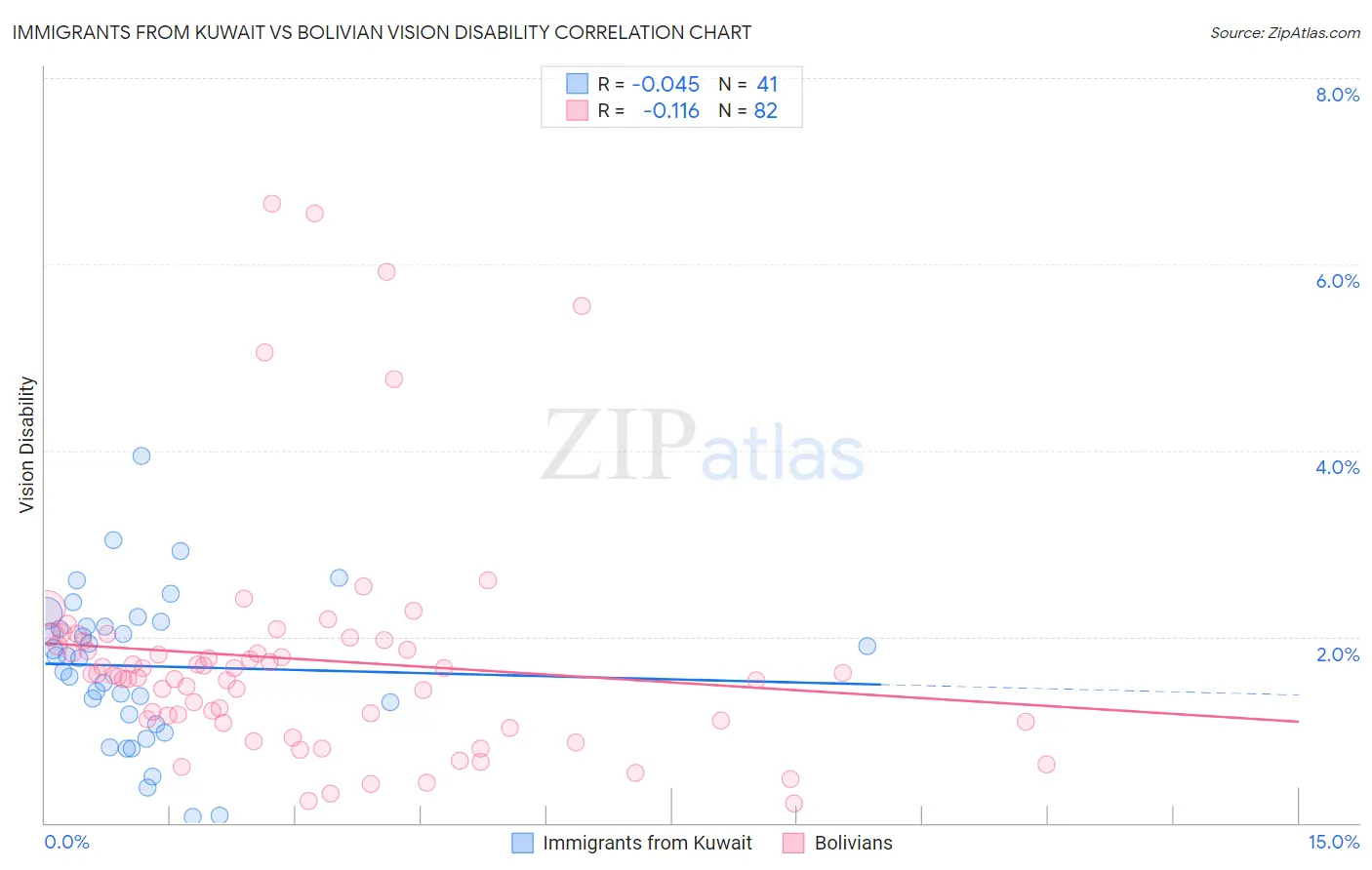Immigrants from Kuwait vs Bolivian Vision Disability
COMPARE
Immigrants from Kuwait
Bolivian
Vision Disability
Vision Disability Comparison
Immigrants from Kuwait
Bolivians
2.0%
VISION DISABILITY
99.8/ 100
METRIC RATING
38th/ 347
METRIC RANK
1.9%
VISION DISABILITY
100.0/ 100
METRIC RATING
18th/ 347
METRIC RANK
Immigrants from Kuwait vs Bolivian Vision Disability Correlation Chart
The statistical analysis conducted on geographies consisting of 136,909,771 people shows no correlation between the proportion of Immigrants from Kuwait and percentage of population with vision disability in the United States with a correlation coefficient (R) of -0.045 and weighted average of 2.0%. Similarly, the statistical analysis conducted on geographies consisting of 184,625,860 people shows a poor negative correlation between the proportion of Bolivians and percentage of population with vision disability in the United States with a correlation coefficient (R) of -0.116 and weighted average of 1.9%, a difference of 5.6%.

Vision Disability Correlation Summary
| Measurement | Immigrants from Kuwait | Bolivian |
| Minimum | 0.068% | 0.21% |
| Maximum | 3.9% | 6.7% |
| Range | 3.9% | 6.4% |
| Mean | 1.7% | 1.8% |
| Median | 1.8% | 1.6% |
| Interquartile 25% (IQ1) | 1.1% | 1.1% |
| Interquartile 75% (IQ3) | 2.1% | 2.0% |
| Interquartile Range (IQR) | 1.0% | 0.85% |
| Standard Deviation (Sample) | 0.81% | 1.3% |
| Standard Deviation (Population) | 0.80% | 1.3% |
Demographics Similar to Immigrants from Kuwait and Bolivians by Vision Disability
In terms of vision disability, the demographic groups most similar to Immigrants from Kuwait are Bhutanese (2.0%, a difference of 0.040%), Cambodian (2.0%, a difference of 0.29%), Immigrants from Australia (1.9%, a difference of 0.63%), Immigrants from Turkey (1.9%, a difference of 0.73%), and Immigrants from Egypt (1.9%, a difference of 0.86%). Similarly, the demographic groups most similar to Bolivians are Immigrants from Sri Lanka (1.9%, a difference of 1.2%), Asian (1.9%, a difference of 2.3%), Turkish (1.9%, a difference of 2.6%), Immigrants from Pakistan (1.9%, a difference of 2.7%), and Immigrants from Asia (1.9%, a difference of 3.2%).
| Demographics | Rating | Rank | Vision Disability |
| Bolivians | 100.0 /100 | #18 | Exceptional 1.9% |
| Immigrants | Sri Lanka | 100.0 /100 | #19 | Exceptional 1.9% |
| Asians | 100.0 /100 | #20 | Exceptional 1.9% |
| Turks | 100.0 /100 | #21 | Exceptional 1.9% |
| Immigrants | Pakistan | 100.0 /100 | #22 | Exceptional 1.9% |
| Immigrants | Asia | 99.9 /100 | #23 | Exceptional 1.9% |
| Immigrants | Lithuania | 99.9 /100 | #24 | Exceptional 1.9% |
| Bulgarians | 99.9 /100 | #25 | Exceptional 1.9% |
| Immigrants | Japan | 99.9 /100 | #26 | Exceptional 1.9% |
| Taiwanese | 99.9 /100 | #27 | Exceptional 1.9% |
| Immigrants | Malaysia | 99.9 /100 | #28 | Exceptional 1.9% |
| Egyptians | 99.9 /100 | #29 | Exceptional 1.9% |
| Immigrants | Nepal | 99.9 /100 | #30 | Exceptional 1.9% |
| Mongolians | 99.9 /100 | #31 | Exceptional 1.9% |
| Luxembourgers | 99.9 /100 | #32 | Exceptional 1.9% |
| Immigrants | Egypt | 99.9 /100 | #33 | Exceptional 1.9% |
| Immigrants | Turkey | 99.8 /100 | #34 | Exceptional 1.9% |
| Immigrants | Australia | 99.8 /100 | #35 | Exceptional 1.9% |
| Cambodians | 99.8 /100 | #36 | Exceptional 2.0% |
| Bhutanese | 99.8 /100 | #37 | Exceptional 2.0% |
| Immigrants | Kuwait | 99.8 /100 | #38 | Exceptional 2.0% |